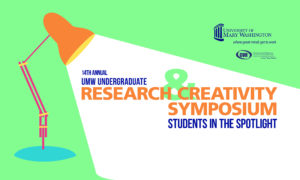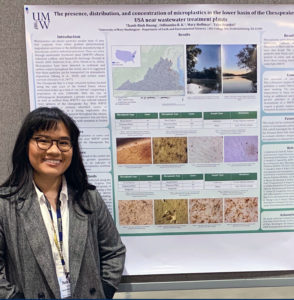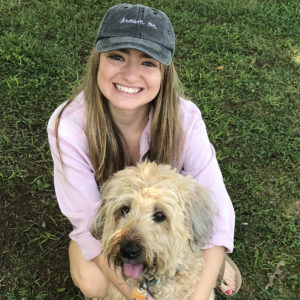They put in the hours – late-night study sessions, one-on-one meetings with faculty members, conferences, presentations and projects. All year long, students have been working hard on one of the University of Mary Washington’s top priorities: undergraduate research.

A pandemic wasn’t about to stop the 14th annual showcase that highlights all of their efforts. Filled with posters in the form of PDF images and oral synopses on video, the UMW Research and Creativity Day Virtual Symposium covers everything from math and science to the performing and visual arts. The online event will be open tomorrow through Friday for questions and comments, and for all-around marveling over UMW students’ ingenuity and drive.
“It’s a time for all of us to pause to celebrate our students’ hard work, their creativity, and the knowledge they’ve produced,” said Assistant Dean of the College of Arts and Sciences Betsy Lewis. “When it was clear we wouldn’t be able to do this face-to-face on campus this year, I really wanted to find a way to replicate that sense of community and celebration.”
Instead of congregating in the Hurley Convergence Center, as they have in the past, students will show off their work on a WordPress website created by Lewis, who said she found conducting her own undergraduate research “life-changing.” She was committed to passing that feeling along by finding a way for students to publicly share their projects, many of which were bound for regional and national conferences that were cancelled due to COVID-19.
The symposium’s 62 submissions – from 145 students – include exploits in everything from pesticides and probiotics to minimum wage and midwifery, from prisons and preservation to embryos and archaeology, from literary explorations to virtual reality. Completed for coursework, capstone projects and departmental honors, the studies and presentations were done individually and in teams, in close consult with faculty advisors. And they’re important.
“Our research can potentially help us understand who may be most affected by the opioid crisis, which will help lawmakers create policies to help those most affected, ” said junior biology major Nicholas Maksimowicz. He worked on his project – “Effect of Higher Education on Opioid Overdose Deaths: A Case Study of the U.S.” – with senior economics major Patrick George.
Junior psychology major Nichole Boigegrain submitted her research on the effects of helicopter parenting. And senior earth and environmental sciences major Thanh-Binh Duong and junior biology major Thomas Bustamante, who both studied micro-plastics, will share their results. (Hear these three students explain their research in their own words by clicking on the project title beneath each photo in this article.)
Simpson Library plans to archive the symposium site, preserving this year’s efforts and noteworthy results. The virtual showcase, Lewis said, will give students a way to reflect on their work once the microscopes and test tubes are all put away, the journals and spreadsheets are finished, and the read-throughs and rehearsals are done.
“It’s a way to showcase their work, give them the feedback and celebration they deserve, and remember their resilience through this crisis for years to come.”
For more information and to explore all the student projects on view, visit UMW Research and Creativity Day Virtual Symposium.


